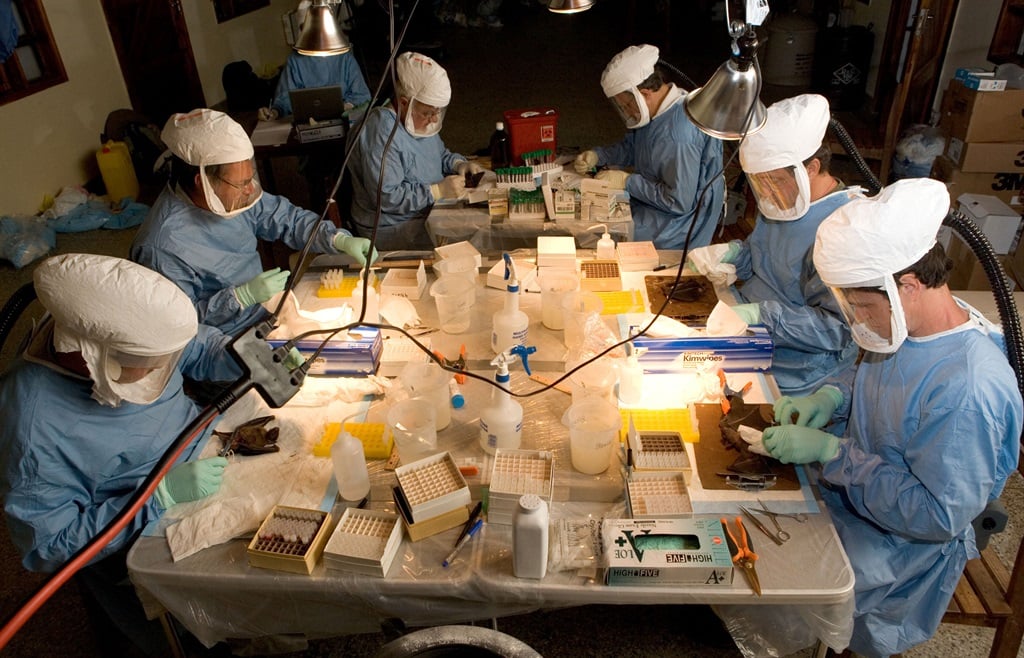
- The Marburg virus outbreak has a fatality ratio of up to 88%.
- It was once detected in South Africa from a person with a travel history to Zimbabwe.
- It is transmitted to people from fruit bats and spreads among humans through direct contact.
Less than a month after the Democratic Republic of Congo (DRC) ended its 14th Ebola outbreak, Ghana on Sunday declared a Marburg virus outbreak.
Two men died after reporting to hospital.
Marburg is in the same family as the virus that causes Ebola.
According to media reports, the two cases, which led to the death of the two men, were detected in the country.
What is Marburg?
According to the World Health Organisation (WHO), it's a "highly virulent disease that causes haemorrhagic fever, with a fatality ratio of up to 88%".
The average fatality rate is around 50%.
The disease was discovered when two large outbreaks occurred simultaneously in Marburg and Frankfurt in Germany, as well as in Belgrade, Serbia, in 1967.
Origins
According to the WHO, the virus was initially recognised in Germany and Belgrade but was associated with laboratory work using African green monkeys (Cercopithecus aethiops) imported from Uganda.
Which are the endemic countries?
There have been sporadic outbreaks in South Africa, Angola, the DRC, Uganda and Kenya. The South African case, in 1975, was detected in a person with a history of having travelled to Zimbabwe.
The Ghana outbreak
In a statement, the WHO said a 26-year-old man and another aged 51 in Ghana showed symptoms that included diarrhoea, fever, nausea and vomiting.
The laboratory corroborated the results from the Noguchi Memorial Institute for Medical Research, which suggested their illness was due to Marburg.
Both men sought treatment at the same hospital within days of each other.
The WHO's regional director for Africa, Dr Matshidiso Moeti, said the organisation was on the ground to contain what could turn out to be a major outbreak.
"Health authorities have responded swiftly, getting a head start preparing for a possible outbreak. This is good because, without immediate and decisive action, Marburg can easily get out of hand.
"[The] WHO is on the ground supporting health authorities and now that the outbreak is declared, we are marshalling more resources for the response," she added.
The WHO is contact tracing at least 90 people, including health workers and residents.
Transmission of Marburg
It is transmitted to people from fruit bats and spreads among humans through direct contact with the bodily fluids of infected people, surfaces and materials.
The WHO said: "Illness begins abruptly, with high fever, severe headache and malaise. Many patients develop severe haemorrhagic signs within seven days."
In 2008, two independent cases were reported in travellers who visited a cave inhabited by Rousettus bat colonies in Uganda.
Cure
According to the WHO, there were no vaccines or antiviral treatments approved to treat the virus.
The only solution to reduce fatalities is supportive care - rehydration with oral or intravenous fluids - and treatment of specific symptoms. A range of potential treatments, including blood products, immune therapies and drug therapies, as well as candidate vaccines with phase 1 data are being evaluated.The News24 Africa Desk is supported by the Hanns Seidel Foundation. The stories produced through the Africa Desk and the opinions and statements that may be contained herein do not reflect those of the Hanns Seidel Foundation




 Publications
Publications
 Partners
Partners























